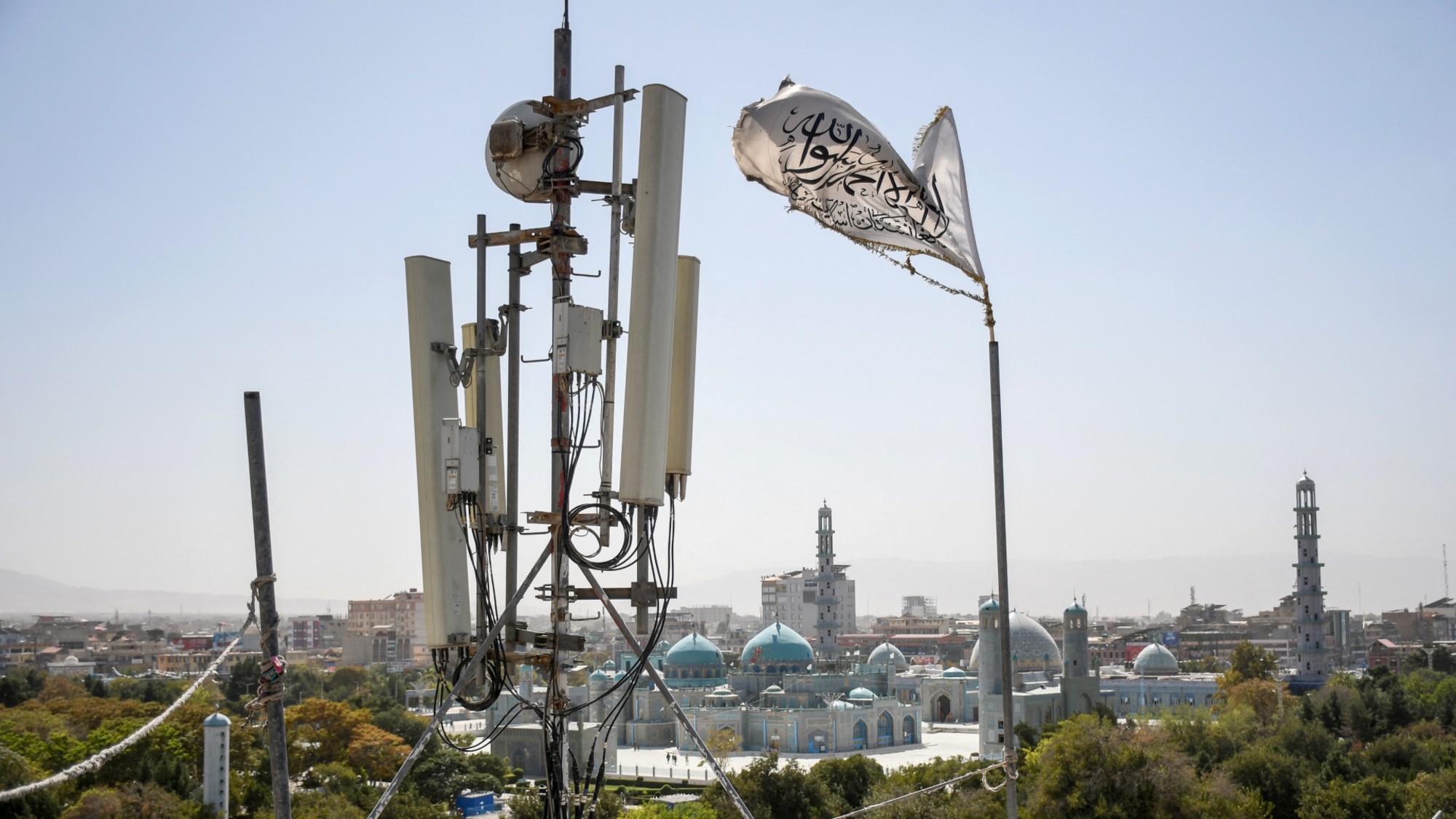The war in Afghanistan has been lost for 2 decades
The Taliban tried to surrender in December 2001. Donald Rumsfeld said no.


A free daily email with the biggest news stories of the day – and the best features from TheWeek.com
You are now subscribed
Your newsletter sign-up was successful
The government of Afghanistan that the U.S. spent almost 20 years, $2.2 trillion, and 2,448 of its own soldiers' lives propping up, getting something like 40,000 Afghan civilians killed, is collapsing. Taliban forces have taken cities across the country with contemptuous ease, and the fall of the capital city Kabul is expected in weeks if not days.
Voices from the foreign policy "Blob" are clamoring for blood. "On Afghanistan, Biden's credibility is now shot," writes Gideon Rachman at the Financial Times. "Jihadists are still out there and very much want to kill us," claims Georgetown professor Paul Miller. Anonymous military officials are telling friendly journalists that Al Qaeda is going to come back.
The reality is that the war in Afghanistan has been lost for nearly 20 years already. Prolonging the fighting can only delay the inevitable.
The Week
Escape your echo chamber. Get the facts behind the news, plus analysis from multiple perspectives.

Sign up for The Week's Free Newsletters
From our morning news briefing to a weekly Good News Newsletter, get the best of The Week delivered directly to your inbox.
From our morning news briefing to a weekly Good News Newsletter, get the best of The Week delivered directly to your inbox.
The collapse of putative Afghan government forces is happening so quickly that the lack of a few thousand American troops cannot possibly be the main reason why. Very likely the Taliban was simply biding its time — only launching its assault once American forces were largely out of the way and seemed unlikely to fight back. Once the Afghan army was on its own, it melted away like butter in a hot skillet.
As I wrote in 2015, and again in 2017, and again in 2019, the U.S.-backed Afghan government has never been worthy of the name. It has always been incompetent, riddled with corruption (thanks in large part to the clumsy and monumentally crooked American occupation), and never had anything like broad legitimacy. The passage of time did nothing to help these problems. It turns out that a domestic government that depends utterly on a ruthless and/or apathetic foreign conqueror whose forces routinely inflict terrible carnage on the local population (either accidentally or on purpose) does not sink deep roots.
As journalist Spencer Ackerman notes, the hard truth is that war in Afghanistan was lost only a few months after it began: in December, 2001. That was when the Taliban, reeling from American attacks, tried to negotiate surrender terms. Their requests were quite modest — mainly just for their leader Mohammad Omar to be able to live under house arrest.
Then-Secretary of Defense Donald Rumsfeld rejected them out of hand. "I do not think there will be a negotiated end to the situation, that's unacceptable to the United States," he said. It takes truly world-historical arrogance to refuse a quick and easy end to a war in the most notoriously hard-to-occupy place on the planet, but that's what happened. (Negotiated settlements were attempted again in 2003 and 2010-11, but neither worked, arguably doomed by Rumsfeld's appalling decision.)
A free daily email with the biggest news stories of the day – and the best features from TheWeek.com
The Taliban thus settled on the only option available to them: a war of attrition. They figured the Americans would be no better at standing up a client government than the Soviets or the British before them, and could be harassed out of the country eventually. They were correct. Anyone with the slightest familiarity with Afghan history — particularly the failure of the incomprehensibly brutal tactics used by Soviet occupiers — could have predicted this outcome.
Twenty years of occupation have not changed the fact that the Taliban is by far the most effective fighting force in Afghanistan. On the contrary, it has made them stronger — allowing them to practice endlessly at guerrilla warfare, to gain support as the most credible force trying to throw off the yoke of despised foreign aggressors, and pick up tons of free weapons. Much of the billions and billions of dollars spent on trying to stand up an Afghan army has ended up directly in Taliban hands, as they pick up equipment abandoned by rotten U.S.-supplied formations. The ongoing rout is handing them all kinds of goodies.
All this makes the argument that U.S. credibility is somehow at stake here completely preposterous. American credibility was already shot from burning up trillions of dollars in war any sane person could see was lost a decade ago. Staying longer and burning up more trillions of dollars would only make America look even more idiotic and self-delusional, and get more people killed in the meantime.
Make no mistake, the Taliban reconquest is going to be brutal for many, particularly women. As Ackerman writes, "One of the consequences of waging Forever Wars is that they obscure what it means to lose a war. This is what it means: the Enemy wins. The Enemy's victory will likely be terrible. Among the reasons it is so terrible is that the United States of America is an accessory to it."
There is only one thing America can do to help the Afghan civilians put in danger by its imperialist bungling: accept refugees. The thousands of people who worked for the American occupation, and the thousands more who are already being displaced by renewed conflict, ought to be able to find a home in the United States. (Just evacuate the people before the date the U.S. has already agreed to remove all troops.)
If the sight of yet another humiliating overseas defeat is troubling, in future let us avoid imperialist wars of aggression.
Ryan Cooper is a national correspondent at TheWeek.com. His work has appeared in the Washington Monthly, The New Republic, and the Washington Post.
-
 The problem with diagnosing profound autism
The problem with diagnosing profound autismThe Explainer Experts are reconsidering the idea of autism as a spectrum, which could impact diagnoses and policy making for the condition
-
 What are the best investments for beginners?
What are the best investments for beginners?The Explainer Stocks and ETFs and bonds, oh my
-
 What to know before filing your own taxes for the first time
What to know before filing your own taxes for the first timethe explainer Tackle this financial milestone with confidence
-
 The billionaires’ wealth tax: a catastrophe for California?
The billionaires’ wealth tax: a catastrophe for California?Talking Point Peter Thiel and Larry Page preparing to change state residency
-
 Bari Weiss’ ‘60 Minutes’ scandal is about more than one report
Bari Weiss’ ‘60 Minutes’ scandal is about more than one reportIN THE SPOTLIGHT By blocking an approved segment on a controversial prison holding US deportees in El Salvador, the editor-in-chief of CBS News has become the main story
-
 Has Zohran Mamdani shown the Democrats how to win again?
Has Zohran Mamdani shown the Democrats how to win again?Today’s Big Question New York City mayoral election touted as victory for left-wing populists but moderate centrist wins elsewhere present more complex path for Democratic Party
-
 Millions turn out for anti-Trump ‘No Kings’ rallies
Millions turn out for anti-Trump ‘No Kings’ ralliesSpeed Read An estimated 7 million people participated, 2 million more than at the first ‘No Kings’ protest in June
-
 ‘The Taliban delivers yet another brutal blow’
‘The Taliban delivers yet another brutal blow’Instant Opinion Opinion, comment and editorials of the day
-
 It is 'beyond time for us to seek bipartisan solutions' for Afghanistan
It is 'beyond time for us to seek bipartisan solutions' for AfghanistanInstant Opinion Opinion, comment and editorials of the day
-
 Ghislaine Maxwell: angling for a Trump pardon
Ghislaine Maxwell: angling for a Trump pardonTalking Point Convicted sex trafficker's testimony could shed new light on president's links to Jeffrey Epstein
-
 The last words and final moments of 40 presidents
The last words and final moments of 40 presidentsThe Explainer Some are eloquent quotes worthy of the holders of the highest office in the nation, and others... aren't
